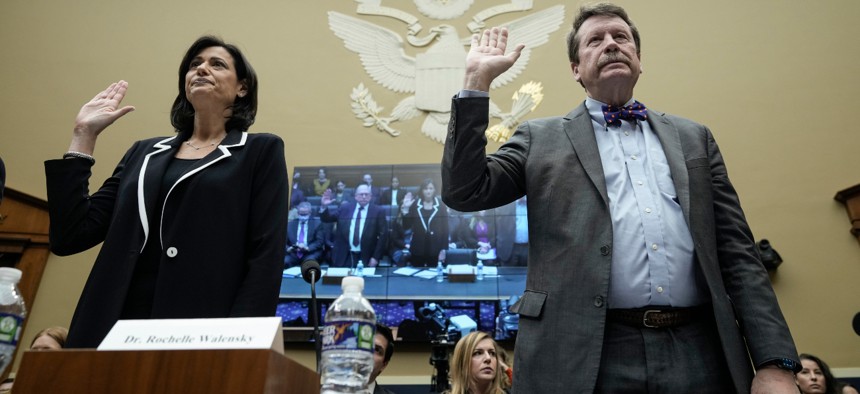
Director of the Centers for Disease Control and Prevention Rochelle Walensky and Commissioner of the Food and Drug Administration Robert Califf are sworn-in during a House Energy and Commerce Subcommittee on Oversight and Investigations and the Subcommittee on Health hearing about the federal response to the coronavirus pandemic on Wednesday. Drew Angerer/Getty Images
Here’s What the End of the COVID-19 Public Health Emergency Could Mean for Federal Agencies
The director of the Centers for Disease Control and Prevention asked Congress for more authority related to health data and the workforce.
Top federal health officials told lawmakers on Wednesday about their plans for ending the COVID-19 public health emergency. The Centers for Disease Control and Prevention director, in particular, made several requests of Congress on data and workforce priorities as it undergoes an overhaul.
President Biden said during his State of the Union on Tuesday night, “COVID no longer controls our lives.” This comes after the White House announced last week the administration is planning to end the COVID-19 national emergency and public health emergency on May 11. Both have been in place since 2020 and have allowed for a series of flexibilities for the federal government’s response.
“I’d like to be clear that we plan to address this emergency and work towards the safety and security of all Americans 24/7 regardless if there’s a public health emergency in place,” said Dr. Rochelle Walensky, CDC director, during a joint hearing by the House Energy and Commerce Committee’s subcommittees on Oversight and Investigations and Health. “It is the case that when the public health emergency comes down we lose some of our ability to see the data. We will lose testing data…We will lose other data as well and we’re actively working right now to set up data use agreements, so that we will have the data that we need.”
One of her requests to Congress is for more authority so the agency doesn’t have to sign dozens of data use agreements, which takes months. She said this will be important for COVID-19, but also for other public health emergencies.
Dr. Lawrence Tabak, acting director of the National Institutes of Health, said the effects of the ending of the public health emergency on NIH will be “modest,” noting they will have to work with their grant community on slight changes.
Dr. Robert Califf, commissioner of the Food and Drug Administration, also said the effects on the FDA will be modest. “FDA has worked on guidance for transitioning devices that fall within enforcement policies issued during the COVID-19 [public health emergency] or that received [emergency use authorizations] to help facilitate a clear and predictable path to market for interested developers,” he said in his prepared statement. “FDA intends to facilitate continued access to devices for patients and healthcare providers during the transition and while marketing submissions are under review.”
The White House made the announcement about the ending of the emergencies in response to legislation brought forth by Republicans that would have ended them immediately. “An abrupt end to the emergency declarations would create wide-ranging chaos and uncertainty throughout the health care system — for states, for hospitals and doctors’ offices, and, most importantly, for tens of millions of Americans,” said a statement of administration policy.
Even as the emergencies are ending, during his address on Tuesday night Biden also re-upped the administration’s call for more funding to support monitoring COVID-19 variants and support the development of new vaccines and treatments. The administration has been repeatedly asking for more funding for a year, but to no avail.
As the CDC has been undergoing internal reforms based on challenges identified earlier in the pandemic, Walensky told lawmakers her agency could use more workforce authorities such as danger pay, overtime pay and tax-free loan repayment in order to enhance its workforce capacity. A report released last month from a bipartisan working group launched by the Center for Strategic and International Studies outlined other workforce-related recommendations to revamp the CDC, which would align it with the authorities that the U.S. Agency for International Development and the Federal Emergency Management Agency have.
During the hearing, lawmakers also pressed the health officials on trust in science, gain-of-function research (something highly scrutinized by Republicans) in light of a recent report from the Government Accountability Office and vaccines. On Thursday, the House Energy and Commerce Committee will vote on its oversight plan for the 118th Congress, which includes much COVID-19 response oversight.







